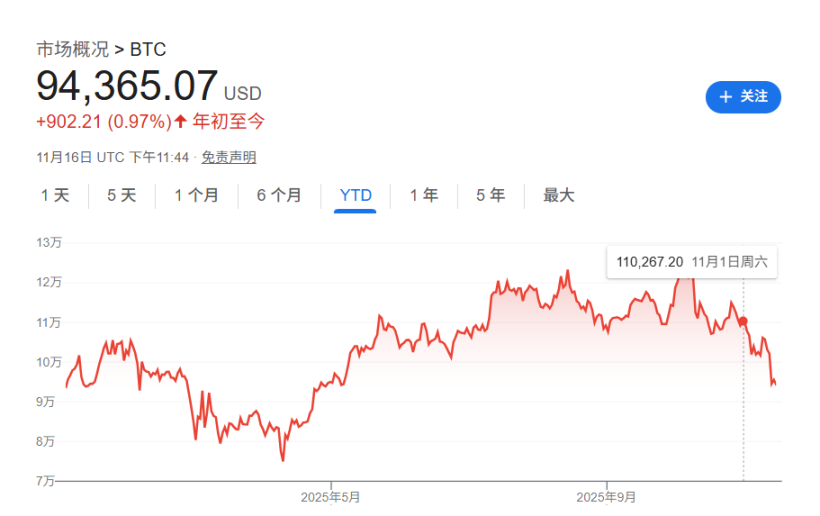Original Title: "This Year’s 30% Gain 'Wiped Out', Bitcoin Enters Bear Market"
Original Author: Long Yue
Original Source: Wall Street Journal
As enthusiasm for the U.S. government's pro-crypto stance wanes and market risk aversion intensifies, Bitcoin is facing a severe test, and the bear market across the entire crypto market seems to be deepening.
As the highest market capitalization cryptocurrency, Bitcoin's price fell below $93,714 on Sunday. This price level is now below its closing price at the end of 2024, meaning that the annual gain of over 30% earlier this year has been "completely wiped out."
This round of plummet occurred just over a month after the asset reached an all-time high. On October 6, Bitcoin's price soared to a record high of $126,251, but four days later, due to unexpected comments on tariffs from U.S. President Trump that triggered turmoil in global markets, Bitcoin began its downward trajectory.
The weakening of institutional participation is one of the core driving forces behind this decline. According to Bloomberg data, Bitcoin exchange-traded funds (ETFs) have attracted over $25 billion in inflows this year, pushing their total assets under management to about $169 billion. These stable funds had previously helped reshape Bitcoin as a diversification tool for investment portfolios.
However, as large buyers (including ETF allocators and corporate finance departments) quietly exit, the narrative of this "hedging asset" is becoming "fragile again." A typical example is Michael Saylor's Strategy Inc., whose stock price is now close to the value of its Bitcoin assets, indicating that investors are no longer willing to pay a premium for its highly leveraged Bitcoin strategy.

Macroeconomic Headwinds and Leverage Liquidation
The shift in the macroeconomic environment is another key factor. Matthew Hougan, Chief Investment Officer of Bitwise Asset Management, pointed out that "the overall market is in risk-off mode," and "cryptocurrency is the canary in the coal mine, reacting first."
The recent pullback in tech stocks has also led to a decline in overall market risk appetite. Jake Kennis, a senior research analyst at Nansen, stated that this sell-off is a confluence of "long-term holders taking profits, institutional capital outflows, macro uncertainty, and the liquidation of leveraged long positions." He added that after a prolonged period of consolidation, the market has temporarily chosen a downward direction.
Altcoins Suffer Even More
The prevailing pessimism in the market is exacerbating the sell-off. Matthew Hougan stated, "The sentiment among retail cryptocurrency investors is quite negative," with many choosing to exit early to avoid experiencing another 50% major pullback. This pessimism is even more pronounced in the market for smaller tokens (i.e., "altcoins") that are more volatile.
Reports indicate that a MarketVector index tracking the bottom 50 of the top 100 digital assets has fallen by about 60% this year. Chris Newhouse, research director at the decentralized finance-focused company Ergonia, also observed that the market is generally skeptical about "capital deployment and lacks natural bullish catalysts."

免责声明:本文章仅代表作者个人观点,不代表本平台的立场和观点。本文章仅供信息分享,不构成对任何人的任何投资建议。用户与作者之间的任何争议,与本平台无关。如网页中刊载的文章或图片涉及侵权,请提供相关的权利证明和身份证明发送邮件到support@aicoin.com,本平台相关工作人员将会进行核查。




